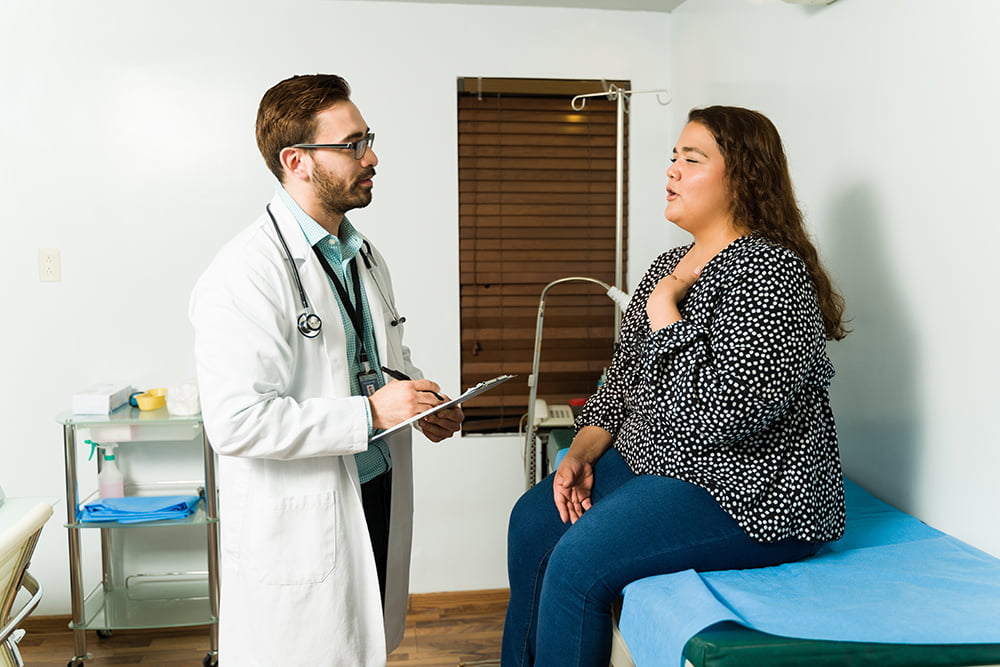The Side Effects and Risks of Bariatric Surgery, According to a Weight Loss Surgeon
Facing the choice of bariatric surgery is a big decision — there are many factors to consider, including the risks and side effects associated with the procedure. It’s common for surgeries to come with risks, but these should not discourage people from choosing a life-saving procedure like bariatric surgery. The benefits to a person’s health following bariatric surgery far outweigh the risks, which can largely be avoided by choosing the right surgery and the right surgeon.
Understanding the Risks and Long-Term Side Effects of Bariatric Weight Loss Surgery
The risks you face immediately after your bariatric surgery are different from the long-term side effects. In any operation, short-term risks are usually due to the surgery itself, including infection, leakage from a surgical site, and blood clot formation. These risks are often very serious and need to be addressed right away. As you begin to heal from the surgery, your body will adapt to the new changes to your stomach and small intestines. This is when the long-term side effects can begin to develop and are dependent on the type of bariatric surgery you receive.
Surgery Risks
Specific surgery techniques involve different parts of the gastrointestinal tract, and some surgeries require more cuts and reconnections to organs. The risks and side effects of weight loss surgery can vary based on the complexity of the operation.
Short-term risks associated with all types of bariatric surgery include the following:
- Infection
- Excessive Bleeding
- Leakage from the surgical site
- Blood clots
- Complications from anesthesia
All surgery carries risks, and these examples are not unique to bariatric surgery. Potential complications are why it’s important to be closely monitored by healthcare professionals after your procedure. Bariatric surgery with ALO Bariatrics is still one of the safest weight loss procedures a person can receive.
The Most Common Side Effects Associated with Bariatric Surgery
Since bariatric surgery involves changes to the stomach and parts of your intestinal tract, most side effects are associated with digestion or nutritional deficiencies.
Here are some of the most commonly reported bariatric surgery side effects:
- Thinning Hair or Hair Loss: It’s not uncommon for patients to go through some degree of hair loss after bariatric surgery. The stress from the surgery can cause your body to go into a protective mode, which diverts nutrients from your scalp and sends them to your internal organs. Fortunately, with enough planning, you can take steps to prevent hair loss after bariatric surgery.
- Nutrient Deficiencies: The small intestine is where a majority of nutrients are absorbed into the body. This is the section of the intestine that’s just after the stomach. Some surgeries require the removal and reattachment of the small intestine, which can decrease the amount of nutrients that are absorbed. It may be necessary to take daily supplements to get the proper amounts of vitamins and nutrients.
- Gastrointestinal Discomfort: Bariatric surgery often results in a smaller stomach and possibly a shorter intestinal tract. These changes can affect the way your body digests and processes foods. As your body heals and gets used to the changes in your gastrointestinal tract, you may experience unpleasant symptoms like nausea, heartburn, diarrhea, constipation, and other gastrointestinal issues. Most of these side effects can be managed through diet and over-the-counter supplements.
Gastric Bypass
The side effects associated with gastric bypass involve both the stomach and the small intestine. The procedure results in a new, small pouch at the top of the stomach and the rerouting of the small intestine to constrict the amount of calories consumed daily. Since this procedure affects the stomach and the small intestine, it has some unique side effects, including:
- Dumping Syndrome: Dumping syndrome can sometimes become a chronic side effect that causes excessive gas, nausea, and diarrhea.
- Ulcers: Gastric bypass surgery increases the risk of developing ulcers where the small intestine reconnects.
- Bowel Obstruction: There is a higher risk of developing a blockage in your intestines after gastric bypass surgery.
- Malabsorption: Vitamins and some foods high in fat can pass quickly through the gastrointestinal tract, resulting in diarrhea and abdominal discomfort.
- Gallstones: One complication of losing weight rapidly is the formation of gallstones.
Gastric Sleeve
The gastric sleeve procedure is one of the most popular, straightforward options at ALO Bariatrics. This procedure can be completed through a single-incision laparoscopic procedure (SILS), which helps decrease the short-term risks and long-term side effects.
Some of the long-term side effects associated with gastric sleeve include:
- Gastroesophageal Reflux Disease (GERD): Otherwise known as heartburn, severe GERD can occur at higher rates with a gastric sleeve procedure.
- Dumping Syndrome: Gastric sleeve procedure has less of a chance of dumping syndrome compared to gastric bypass, but there is a small chance this syndrome could develop.
- Stricture: A stricture can develop over time, which is a further narrowing of the GI tract, leading to difficulty swallowing and requiring another procedure.
The gastric sleeve procedure has significantly lower rates of nearly all complications compared to gastric bypass surgery and is considered a safer, less complicated surgery with a minimal recovery time.
Duodenal Switch
The biliopancreatic diversion with duodenal switch (BPDS) surgery involves bypassing some of the small intestine in addition to decreasing the size of the stomach. This surgery has a few more steps and reconnections of the intestines and has a higher likelihood of some side effects, including:
- Bowel obstruction: When the intestines are cut and rerouted, there is a higher likelihood of developing a bowel obstruction or blockage.
- Ventral hernia: This type of hernia is where the contents of the abdominal cavity push through the muscle layer of the abdomen. Hernias can require surgery to correct the problem.
- Anastomotic leaks: When two ends of the organs are connected, there is a chance fluid may leak out around the junction. This can lead to infection and require another surgery to fix.
While this isn’t a complete list of all possible side effects, the rates of complications have been reported to be similar to that of gastric bypass surgery.
SADI-S
The single anastomosis duodenal-ileal bypass with sleeve gastrectomy surgery (SADI-S) is an alternative to gastric bypass and BDPS for treating severe obesity. The procedure involves the combination of a sleeve gastrectomy and duodenal switch but only requires one section of the small intestine to be reconnected, rather than two with the duodenal switch. This technique has shown low rates of side effects, some of which include:
- Nausea and vomiting: These are the most common, short-term side effects after surgery.
- Stricture: The most common long-term complication is a stricture or narrowing of a section of the GI tract that sometimes needs surgical correction.
SADI-S has one of the lowest rates of developing complications compared to other procedures. Talk to a bariatric specialist at ALO Bariatrics today to learn more about the SADI-S bariatric surgery side effects.
When the Benefits of Bariatric Surgery Can Outweigh the Risks
Being overweight is riskier for your short-term and long-term health, far more than any risk or complication caused by bariatric surgery side effects. Obesity is the second leading cause of preventable death across the world. Death from obesity is linked to several comorbidities that are more likely to develop, including:
- Type 2 diabetes (T2DM): A 1,200% increase in the risk of developing diabetes.
- Cardiovascular disease: 50% increased risk of developing cardiovascular disease.
- Stroke: Obesity can increase the risk of ischemic stroke by up to 64% and hemorrhagic stroke by 24%.
- GERD: You are twice as likely to develop GERD if you are overweight.
- Precancerous Barret’s esophagus: An obese person is four times more likely to develop this condition.
- Stomach cancer: 50% more likely to develop stomach cancer if you’re obese.
- Diverticular Disease: Painful diseases of the colon and large intestine are 80% higher in obese patients.
As you can see, the risks of obesity are alarming and are far more serious and frequent than any risk or complication associated with bariatric surgery.
It’s normal to be concerned about bariatric surgery’s side effects and risks, but compared to the alternatives, losing weight through bariatric surgery is the safest choice for your overall health.
ALO Bariatrics in Mexico remains one of the most trusted destinations to receive bariatric surgery for medical tourism. Scheduling a consultation is fast and easy. S
Speak with one of our experienced bariatric surgeons today for more information on beginning your weight loss journey with ALO Bariatrics.

Dr. Alejandro Lopez, the owner and lead bariatric surgeon at ALO Bariatrics, is a Fellow at the American College of Surgeons and is accredited with the American Society for Metabolic and Bariatric Surgery. He is also a certified bariatric surgeon by the Mexican College of Surgery for Obesity and Metabolic Diseases. He is one of two surgeons in Tijuana and one out of five to ten in all of Mexico who is able to provide robotic surgery.


